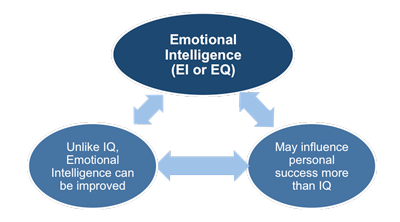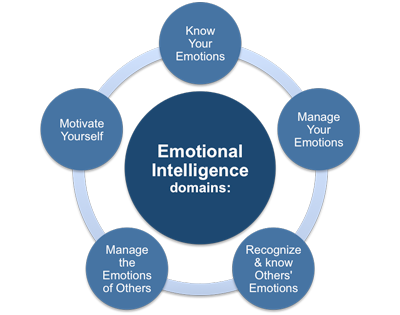Understanding Emotional Intelligence
Over the last two decades organizations have seen a fundamental shift in management style. Roles have become more customer orientated and knowledge based with the need to work as a team. This has resulted in individuals having more overall autonomy, even at fairly low levels within organizations.
This has created organizational cultures that are less autocratic with only a few levels of management. The very nature of such organizations has allowed those with highly developed social skills to be as successful as those who excel academically. The historical time line of 'social or emotional intelligence' shows this is not a new concept, but one that over time has gained general agreement as a key element of workplace success. Emotional intelligence can be abbreviated to (EI), and can also be referred to as Emotional Quotient (EQ).
 |
The psychologists Salovey and Mayer originally coined the term 'emotional intelligence' in 1990. However, Daniel Goleman popularized it in 1995 in the title of his bestselling book, Emotional Intelligence: Why it can Matter More than IQ. Goleman defined emotional intelligence as:
'Understanding one's own feelings, empathy for the feelings of others and the regulation of emotion in a way that enhances living.'
What made this book so popular were two claims:
Firstly, Emotional intelligence may be more important for personal success than IQ.
Secondly, Unlike IQ emotional intelligence can be improved.
These two claims resonated with people and made the idea of emotional intelligence a hot topic for anyone involved with personal development.
 |
Whilst Goleman's first book made a compelling case for the importance of emotional intelligence theory (EQ - Emotional Quotient), there was no practical means of applying it to management situations. In this book he identified the five 'domains' of EQ:
• Knowing your emotions
• Managing your own emotions
• Motivating yourself
• Recognizing and understanding other people's emotions
• Managing relationships (i.e. managing the emotions of others)
In Working with Emotional Intelligence, his second book, he explored how our performance at work related to how we dealt with others and conducted ourselves.
Since 1995 numerous business books have been written on emotional intelligence in the workplace and most authors have used Goleman's model. Whilst there is some common agreement between Goleman and other authors and researchers that:
• Emotional intelligence exists
• It is a factor in personal and professional success
• It can be improved
There are also some quite fundamental disagreements. This is not surprising in a relatively immature area of psychology that has a great deal of prestige and financial rewards associated with it. For academic researchers this prestige takes the form of professional recognition and associated funds for research. For commercial organizations it is the financial rewards gained from creating and selling a proprietary method for staff selection or professional development.
The job of a manager is to achieve business and personal objectives through the use of other people. These include the manager's own team and other managers within the organization, as well as customers and suppliers. To be a successful manager you need to have a good understanding of emotional intelligence, how well developed your own EI, is and how to use it to achieve your objectives.
You may also be interested in:
Goleman's Model of EI | Emotional Quotient (EQ) and IQ | EQ and Management | EQ Timeline | Can EQ be Developed? | Personal Competence | Social Competence | EQ Framework.



